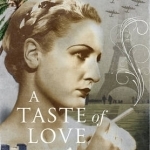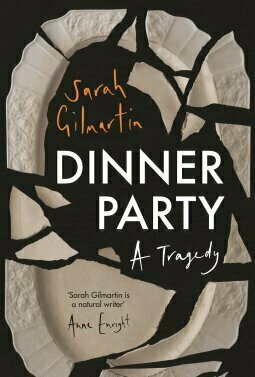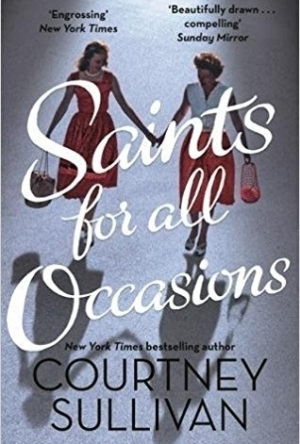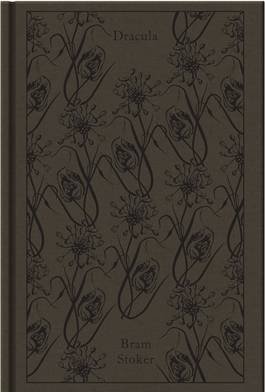Search
Kristy H (1252 KP) rated Saints for All Occasions in Books
Mar 6, 2019
Beautiful story of parenthood, immigration, siblings, religion, and so much more
Nora and Theresa Flynn are only twenty-one and seventeen when they leave their native Ireland and immigrate to the U.S. For her entire life, Nora has been the quintessential older sister, raising Theresa and their younger brother after the death of their mother. Now she's headed to Boston to be married to their former Irish neighbor, Charlie, whom Nora doesn't really even love. Theresa, meanwhile, is outgoing, beautiful, and intelligent. She loves the dances and social atmosphere in Boston, but that all changes when she winds up pregnant. Both Nora and Theresa are forced to make some drastic life decisions that will affect them for the rest of their lives. Fifty years later, in 2009, Nora and Charlie have four children: John, Bridget, Brian, and Patrick. But Theresa and Nora are no longer speaking, and Theresa lives as a cloistered nun in an abbey in Vermont. What happened between the two sisters? And how will a sudden tragedy affect their current, separate lives?
This was an amazing book - just beautiful, heartbreaking, and lovely. Sullivan captured the essence of each of her characters so perfectly. I could picture every one, and each was so realistic, with their own background, mannerisms, and details.
The novel switches between the past, starting with Nora and Theresa's journey to Boston, and 2009, with a shocking event that rocks the entire family. We hear from each character--Nora, Theresa, John, Bridget, Brian, and Patrick. As I said, they are each an individual and embellished with Sullivan's wonderful writing and details. For instance, I loved the tidbit that Nora and her daughter-in-law communicated for years mainly through Nora's daughter's dog at family gatherings. It said so much with just one story. (And I've so been there.)
I became attached to each character in their own way thanks to the strong writing and characterization. I don't always enjoy books with shifts between time periods, but all flowed seamlessly here. There's an underlying thread that ties everything together, just adding to the brilliance of the novel. While it's really a story of a family, there's still a bit of suspense, as you try to fit some pieces together. Everything works so well.
Overall, I just loved this beautiful story of parenthood, immigration, siblings, religion, and so much more. It's achingly well-written, and while it ended just right, I was still sad to see the characters go. I'll certainly be recommending it to everyone I know
This was an amazing book - just beautiful, heartbreaking, and lovely. Sullivan captured the essence of each of her characters so perfectly. I could picture every one, and each was so realistic, with their own background, mannerisms, and details.
The novel switches between the past, starting with Nora and Theresa's journey to Boston, and 2009, with a shocking event that rocks the entire family. We hear from each character--Nora, Theresa, John, Bridget, Brian, and Patrick. As I said, they are each an individual and embellished with Sullivan's wonderful writing and details. For instance, I loved the tidbit that Nora and her daughter-in-law communicated for years mainly through Nora's daughter's dog at family gatherings. It said so much with just one story. (And I've so been there.)
I became attached to each character in their own way thanks to the strong writing and characterization. I don't always enjoy books with shifts between time periods, but all flowed seamlessly here. There's an underlying thread that ties everything together, just adding to the brilliance of the novel. While it's really a story of a family, there's still a bit of suspense, as you try to fit some pieces together. Everything works so well.
Overall, I just loved this beautiful story of parenthood, immigration, siblings, religion, and so much more. It's achingly well-written, and while it ended just right, I was still sad to see the characters go. I'll certainly be recommending it to everyone I know
Kristy H (1252 KP) rated Saints for All Occasions in Books
Jan 30, 2018
Well-written (1 more)
Striking characters
Gorgeous family saga
Nora and Theresa Flynn are only twenty-one and seventeen when they leave their native Ireland and immigrate to the U.S. For her entire life, Nora has been the quintessential older sister, raising Theresa and their younger brother after the death of their mother. Now she's headed to Boston to be married to their former Irish neighbor, Charlie, whom Nora doesn't really even love. Theresa, meanwhile, is outgoing, beautiful, and intelligent. She loves the dances and social atmosphere in Boston, but that all changes when she winds up pregnant. Both Nora and Theresa are forced to make some drastic life decisions that will affect them for the rest of their lives. Fifty years later, in 2009, Nora and Charlie have four children: John, Bridget, Brian, and Patrick. But Theresa and Nora are no longer speaking, and Theresa lives as a cloistered nun in an abbey in Vermont. What happened between the two sisters? And how will a sudden tragedy affect their current, separate lives?
This was an amazing book - just beautiful, heartbreaking, and lovely. Sullivan captured the essence of each of her characters so perfectly. I could picture every one, and each was so realistic, with their own background, mannerisms, and details.
The novel switches between the past, starting with Nora and Theresa's journey to Boston, and 2009, with a shocking event that rocks the entire family. We hear from each character--Nora, Theresa, John, Bridget, Brian, and Patrick. As I said, they are each an individual and embellished with Sullivan's wonderful writing and details. For instance, I loved the tidbit that Nora and her daughter-in-law communicated for years mainly through Nora's daughter's dog at family gatherings. It said so much with just one story. (And I've so been there.)
I became attached to each character in their own way thanks to the strong writing and characterization. I don't always enjoy books with shifts between time periods, but all flowed seamlessly here. There's an underlying thread that ties everything together, just adding to the brilliance of the novel. While it's really a story of a family, there's still a bit of suspense, as you try to fit some pieces together. Everything works so well.
Overall, I just loved this beautiful story of parenthood, immigration, siblings, religion, and so much more. It's achingly well-written, and while it ended just right, I was still sad to see the characters go. I'll certainly be recommending it to everyone I know.
This was an amazing book - just beautiful, heartbreaking, and lovely. Sullivan captured the essence of each of her characters so perfectly. I could picture every one, and each was so realistic, with their own background, mannerisms, and details.
The novel switches between the past, starting with Nora and Theresa's journey to Boston, and 2009, with a shocking event that rocks the entire family. We hear from each character--Nora, Theresa, John, Bridget, Brian, and Patrick. As I said, they are each an individual and embellished with Sullivan's wonderful writing and details. For instance, I loved the tidbit that Nora and her daughter-in-law communicated for years mainly through Nora's daughter's dog at family gatherings. It said so much with just one story. (And I've so been there.)
I became attached to each character in their own way thanks to the strong writing and characterization. I don't always enjoy books with shifts between time periods, but all flowed seamlessly here. There's an underlying thread that ties everything together, just adding to the brilliance of the novel. While it's really a story of a family, there's still a bit of suspense, as you try to fit some pieces together. Everything works so well.
Overall, I just loved this beautiful story of parenthood, immigration, siblings, religion, and so much more. It's achingly well-written, and while it ended just right, I was still sad to see the characters go. I'll certainly be recommending it to everyone I know.

Queen Elizabeth II: Her Life in Our Times
Book
From Sarah Bradford, the best-selling author of George VI, Elizabeth and Diana, the definitive...

A Taste of Love
Book
'I have starved in some of the most beautiful places in the world ...' The Irish Times food writer...
LilyLovesIndie (123 KP) rated Red Sky in Morning in Books
Nov 5, 2018
Check out the review on my blog, Lily Loves Indie, here http://lilylovesindie.co.uk/?p=27
I received this book through NetGalley in return for an honest review, and that I am very grateful for this opportunity to broaden my reading experience. This is a very different book to what I would usually read, with a different style of writing and plot development. Nevertheless, I did find it somewhat enjoyable, even if it was lacking in a couple of places.
The story follows the harsh life of Coll Coyle, a young Irish man struggling to keep his home for his family from a vile landlord. It seems things can only get worse as the saga progresses, with John Faller, a formidable gentleman, following him all the way around the world. Although he meets a good friend, his heart never truly leaves the loved ones left behind in Ireland.
Initially, this story is rather tough to get into, and that isn't something that changes much over the course of the book. Written in a strong Irish brogue, at times it can be quite difficult to read, however this becomes easier as you go further through the book. It does help you feel more immersed in the story though as it strangely flows quite naturally when you're reading.
The plot is something that, if I'm totally honest, needs a little work. It's just rather plodding and slow at times, and even after finishing it, I don't feel like the story really went anywhere and was never aiming for a conclusion. In addition, at times it was very depressing to read, and I had to put it down in favour of something a little more light-hearted.
All that as it was, there is one major redeeming feature in this book that had me reading to the end. The imagery is truly exquisite - Lynch really does have great skill at weaving the description through the story. This was a delight to read as the images just appeared with minimal effort from myself straight into my head.
Overall, I enjoyed this book, but it probably wouldn't be one I'd read over and over again. The description is by far it's greatest feature but it is, on the whole, something I'm glad I've read.
I received this book through NetGalley in return for an honest review, and that I am very grateful for this opportunity to broaden my reading experience. This is a very different book to what I would usually read, with a different style of writing and plot development. Nevertheless, I did find it somewhat enjoyable, even if it was lacking in a couple of places.
The story follows the harsh life of Coll Coyle, a young Irish man struggling to keep his home for his family from a vile landlord. It seems things can only get worse as the saga progresses, with John Faller, a formidable gentleman, following him all the way around the world. Although he meets a good friend, his heart never truly leaves the loved ones left behind in Ireland.
Initially, this story is rather tough to get into, and that isn't something that changes much over the course of the book. Written in a strong Irish brogue, at times it can be quite difficult to read, however this becomes easier as you go further through the book. It does help you feel more immersed in the story though as it strangely flows quite naturally when you're reading.
The plot is something that, if I'm totally honest, needs a little work. It's just rather plodding and slow at times, and even after finishing it, I don't feel like the story really went anywhere and was never aiming for a conclusion. In addition, at times it was very depressing to read, and I had to put it down in favour of something a little more light-hearted.
All that as it was, there is one major redeeming feature in this book that had me reading to the end. The imagery is truly exquisite - Lynch really does have great skill at weaving the description through the story. This was a delight to read as the images just appeared with minimal effort from myself straight into my head.
Overall, I enjoyed this book, but it probably wouldn't be one I'd read over and over again. The description is by far it's greatest feature but it is, on the whole, something I'm glad I've read.

Dinner Party: A Tragedy
Book
A MAJOR 2021 DEBUT FICTION LAUNCH, THIS REMARKABLE IRISH NOVEL ABOUT THE MESSINESS OF MODERN FAMILY...
The Bandersnatch (199 KP) rated Dracula in Books
Nov 7, 2019
Dracula was written by author Bram Stoker during the late 1890's and is set around the character of Dracula and his attempt to move from Transylvania to England so he can spread the curse of the undead (I.e. the creation of more vampires). English solicitor Jonathan Harker who'd originally gone to Transylvania to be legal aide for Dracula stops him with the help of Van Helsing and others which ends the life of one of them – Quincey-, the book ends with a note from Jonathan Harker that several people lived happily married and Jonathan has a son nicknamed for Quincey.
Dracula was published in London in May 1897 by Archibald Constable & Company and was later copyrighted in the U.S in 1899 and published by Doubleday & McClure of New York. Despite having decent praise form reviewers it wasn't an immediate bestseller. Although the English newspaper the Daily Mail ranked Stoker's writing prowess in Dracula above that of Mary Shelly, Edgar Allen Poe and Emily Bronte's Wuthering heights. Unfortunately it didn't make Stoker that much money and he'd had to petition for a compassionate grant from the royal literary fund. When he died his widow was forced to sell his notes and outlines of the book at an auction in 1913. It was the unauthorised adaption of Nosferatu by F. W. Murnau in 1922 and the resulting legal battle made when Stokers widow took affront that the novels popularity began to grow.
Before writing Dracula Bram Stoker had been researching European folklore and stories of vampires having been most influenced by Emily Gerard's “Transylvania Superstitions” 1885 essay...which included content about the vampire myth. Some historians insist that Vlad iii Dracula (More commonly known as Vlad the impaler) was the model for Stokers count but there's been no supporting evidence to make that true. According to one expert Stoker only borrowed the barest minimum of information of the Wallachian tyrant and he's not even mentioned in Stokers notes. Stoker was a member of the London library during the 1890's where books by Sabine Baring-Gould, Thomas Browne, AF Crosse and Charles Boner are attributed to Stokers research. Stoker would later claim he'd had a nightmare caused by over-eating crab meat about a “Vampire king” rising from his grave. Whitby on the Yorkshire coast contributed its landscape since Bram Stoker often holidayed there during the summer.
Dracula wasn't Stokers first choice as title for the story since he cycled through The Dead Un-Dead then simply the Un-Dead the count wasn't even supposed to be Count Dracula having had the name Count Wampyr for several drafts before Stoker became intrigued by the name Dracula. After reading “An account of the principles of Wallachia and Moldavia with political observations relative to them” written by author William Wilkinson (Published in 1820). the descendants of Vlad ii of Wallachia took the name Dracula or Dracul after being invested in the Order of the Dragon in 1431. In the old Romanian language the word Dracul mean “the Dragon” and Dracula meant “Son of the Dragon”. Nowadays however Dracul means “the Devil”
Whilst Dracula is known as THE Vampire novel its not the first. Johan Wolfgang Von Goethe had his book the Bride of Corinth published in 1797, 1871's Carmilla (a story about a lesbian vampire) was written by Sheridan Le Frau and James Malcolm Rymer's penny dreadful series Venny the Vampire was a product from the mid Victorian period. Even John Polidori created an image of a vampyric aristocrat in his 1819 story The Vampyre when he spent a summer with Merry Shelly (creator of Frankenstein) and her poet husband Percy Bysshe Shelly and Lord Bryon in 1816.
I really love Dracula. It showed the madness, the ethereal quality and the ultimate danger of what a vampire could do. Like many other goth inclined teenagers trying to find their feet in the world Dracula definitely added its two cents to my self worth and love of all things macabre. The fact it was written by a Victorian writer has added a unusual depth to the story as only a Victorian writer could. The culture of the Vampire has become deep rooted and wide spread in its acceptance and Dracula has definitely spearheaded such a phenomenon.
Abraham “Bram” Stoker was Born in Dublin, Ireland on the 8th of November 1847, He was the third of seven children born to Abraham and Charlotte Stoker and was bedridden with an unknown illness until he recovered at seven. He started schooling at a private school run by the Reverend William Woods and grew up without serious illness. Stoker excelled at sports at Trinity College Dublin having graduated in 1870 with a BA (Bachelor of Arts). He was an Auditor of the College Historical Society and the president of the University Philosophical Society where his first paper was on Sensationalism in fiction and society.
Thanks to his friend Dr. Maunsell, Stoker became interested in the theatre as a student and whilst working for the Irish civil service he became a theatre critic for the Dublin evening mail where he attracted notice for the quality of his reviews. Stoker gave a favourable review of Henry Irving's adaption of Hamlet in December 1876, this prompted Irving to invite him to dinner where they ended up becoming friends. Stoker wrote The Crystal Cup which was published by the London society in 1872 and The chain of Destiny which was released in four parts in the Shamrock. Stoker also wrote the non-fiction book the duties of clerks of petty sessions in Ireland which was published in 1879.
Bram stoker married Florence Balcombe the daughter of a lieutenent-colonel in 1978 and they moved to London. Where Stoker ended up the Business manager of the Lyceum theatre as well as manager for Henry Irving- a position he held for 27 years. Despite being a very busy man Stoker ended up writing several novels (as well as Dracula) Including The Snakes pass in 1890, the lady of the shroud in 1909 and the lair of the white worm in 1911. when Henry Irving died in 1906 he published his personal reminiscences of Henry Irving. Stoker also managed productions at the Prince of Wales theatre.
Bram stoker died after a series of strokes in London on April 20th 1912, the cause of death is split between the possibility of Tertiary Syphilis or overwork. He was cremated and was placed in a display urn at Golders Green Crematorium in North London, he was later joined by the ashes of his Son Irving Noel Stoker in 1961, his wife Florence was meant to join them but her ashes were scattered at the Gardens of rest.
Stoker was honoured with a Google Doogle (the banner on goggles homepage) on November 8th 2012 commemorating the 165th anniversary of his birth. An annual festival in honour of Bram Stoker happens in Dublin, its supported by the Bram stoker estate and was/is usually funded by Dublin City Council and Failte Ireland.
My opinion of Bran stoker is that of a decent hard working man who loved life. Stoker epitomises the phrases of “a man on a mission” and “a man who hussles”. Having worked extremely hard both creatively as a novelist and business wise as a theatre manager Stoker pretty much showed that if you work hard you could pretty much do anything you set your mind to.
And there you have it a book for all the ages, definitely under the banner of AWESOME!!!.
Dracula was published in London in May 1897 by Archibald Constable & Company and was later copyrighted in the U.S in 1899 and published by Doubleday & McClure of New York. Despite having decent praise form reviewers it wasn't an immediate bestseller. Although the English newspaper the Daily Mail ranked Stoker's writing prowess in Dracula above that of Mary Shelly, Edgar Allen Poe and Emily Bronte's Wuthering heights. Unfortunately it didn't make Stoker that much money and he'd had to petition for a compassionate grant from the royal literary fund. When he died his widow was forced to sell his notes and outlines of the book at an auction in 1913. It was the unauthorised adaption of Nosferatu by F. W. Murnau in 1922 and the resulting legal battle made when Stokers widow took affront that the novels popularity began to grow.
Before writing Dracula Bram Stoker had been researching European folklore and stories of vampires having been most influenced by Emily Gerard's “Transylvania Superstitions” 1885 essay...which included content about the vampire myth. Some historians insist that Vlad iii Dracula (More commonly known as Vlad the impaler) was the model for Stokers count but there's been no supporting evidence to make that true. According to one expert Stoker only borrowed the barest minimum of information of the Wallachian tyrant and he's not even mentioned in Stokers notes. Stoker was a member of the London library during the 1890's where books by Sabine Baring-Gould, Thomas Browne, AF Crosse and Charles Boner are attributed to Stokers research. Stoker would later claim he'd had a nightmare caused by over-eating crab meat about a “Vampire king” rising from his grave. Whitby on the Yorkshire coast contributed its landscape since Bram Stoker often holidayed there during the summer.
Dracula wasn't Stokers first choice as title for the story since he cycled through The Dead Un-Dead then simply the Un-Dead the count wasn't even supposed to be Count Dracula having had the name Count Wampyr for several drafts before Stoker became intrigued by the name Dracula. After reading “An account of the principles of Wallachia and Moldavia with political observations relative to them” written by author William Wilkinson (Published in 1820). the descendants of Vlad ii of Wallachia took the name Dracula or Dracul after being invested in the Order of the Dragon in 1431. In the old Romanian language the word Dracul mean “the Dragon” and Dracula meant “Son of the Dragon”. Nowadays however Dracul means “the Devil”
Whilst Dracula is known as THE Vampire novel its not the first. Johan Wolfgang Von Goethe had his book the Bride of Corinth published in 1797, 1871's Carmilla (a story about a lesbian vampire) was written by Sheridan Le Frau and James Malcolm Rymer's penny dreadful series Venny the Vampire was a product from the mid Victorian period. Even John Polidori created an image of a vampyric aristocrat in his 1819 story The Vampyre when he spent a summer with Merry Shelly (creator of Frankenstein) and her poet husband Percy Bysshe Shelly and Lord Bryon in 1816.
I really love Dracula. It showed the madness, the ethereal quality and the ultimate danger of what a vampire could do. Like many other goth inclined teenagers trying to find their feet in the world Dracula definitely added its two cents to my self worth and love of all things macabre. The fact it was written by a Victorian writer has added a unusual depth to the story as only a Victorian writer could. The culture of the Vampire has become deep rooted and wide spread in its acceptance and Dracula has definitely spearheaded such a phenomenon.
Abraham “Bram” Stoker was Born in Dublin, Ireland on the 8th of November 1847, He was the third of seven children born to Abraham and Charlotte Stoker and was bedridden with an unknown illness until he recovered at seven. He started schooling at a private school run by the Reverend William Woods and grew up without serious illness. Stoker excelled at sports at Trinity College Dublin having graduated in 1870 with a BA (Bachelor of Arts). He was an Auditor of the College Historical Society and the president of the University Philosophical Society where his first paper was on Sensationalism in fiction and society.
Thanks to his friend Dr. Maunsell, Stoker became interested in the theatre as a student and whilst working for the Irish civil service he became a theatre critic for the Dublin evening mail where he attracted notice for the quality of his reviews. Stoker gave a favourable review of Henry Irving's adaption of Hamlet in December 1876, this prompted Irving to invite him to dinner where they ended up becoming friends. Stoker wrote The Crystal Cup which was published by the London society in 1872 and The chain of Destiny which was released in four parts in the Shamrock. Stoker also wrote the non-fiction book the duties of clerks of petty sessions in Ireland which was published in 1879.
Bram stoker married Florence Balcombe the daughter of a lieutenent-colonel in 1978 and they moved to London. Where Stoker ended up the Business manager of the Lyceum theatre as well as manager for Henry Irving- a position he held for 27 years. Despite being a very busy man Stoker ended up writing several novels (as well as Dracula) Including The Snakes pass in 1890, the lady of the shroud in 1909 and the lair of the white worm in 1911. when Henry Irving died in 1906 he published his personal reminiscences of Henry Irving. Stoker also managed productions at the Prince of Wales theatre.
Bram stoker died after a series of strokes in London on April 20th 1912, the cause of death is split between the possibility of Tertiary Syphilis or overwork. He was cremated and was placed in a display urn at Golders Green Crematorium in North London, he was later joined by the ashes of his Son Irving Noel Stoker in 1961, his wife Florence was meant to join them but her ashes were scattered at the Gardens of rest.
Stoker was honoured with a Google Doogle (the banner on goggles homepage) on November 8th 2012 commemorating the 165th anniversary of his birth. An annual festival in honour of Bram Stoker happens in Dublin, its supported by the Bram stoker estate and was/is usually funded by Dublin City Council and Failte Ireland.
My opinion of Bran stoker is that of a decent hard working man who loved life. Stoker epitomises the phrases of “a man on a mission” and “a man who hussles”. Having worked extremely hard both creatively as a novelist and business wise as a theatre manager Stoker pretty much showed that if you work hard you could pretty much do anything you set your mind to.
And there you have it a book for all the ages, definitely under the banner of AWESOME!!!.
David McK (3165 KP) rated Blood's Game in Books
Jan 30, 2019
Like, I'm sure, many others, my first exposure to the writings of [a:Angus Donald|584064|Angus Donald|https://s.gr-assets.com/assets/nophoto/user/m_50x66-82093808bca726cb3249a493fbd3bd0f.png] was when I picked up [b:Outlaw|6624899|Outlaw (The Outlaw Chronicles, #1)|Angus Donald|https://images.gr-assets.com/books/1347668868s/6624899.jpg|6819139] on sale: a novel which reimagined the familiar character of Robin Hood, and which I thoroughly enjoyed: so much so that I made it a point to pick up all the novels in that series ([b:Outlaw|6624899|Outlaw (The Outlaw Chronicles, #1)|Angus Donald|https://images.gr-assets.com/books/1347668868s/6624899.jpg|6819139], [b:Holy Warrior|7710240|Holy Warrior (The Outlaw Chronicles, #2)|Angus Donald|https://images.gr-assets.com/books/1327539941s/7710240.jpg|10428506], [b:King's Man|11351795|King's Man (The Outlaw Chronicles, #3)|Angus Donald|https://images.gr-assets.com/books/1328436464s/11351795.jpg|16281574], [b:Warlord|13077584|Warlord (The Outlaw Chronicles, #4)|Angus Donald|https://images.gr-assets.com/books/1342984405s/13077584.jpg|18244685], [b:Grail Knight|20613734|Grail Knight (The Outlaw Chronicles #5)|Angus Donald|https://images.gr-assets.com/books/1410172817s/20613734.jpg|21976159], [b:The Iron Castle|19857964|The Iron Castle (Outlaw Chronicles, #6)|Angus Donald|https://images.gr-assets.com/books/1402550564s/19857964.jpg|27860558] and (finally) [b:The Death of Robin Hood|29348050|The Death of Robin Hood (The Outlaw Chronicles, #8)|Angus Donald|https://images.gr-assets.com/books/1467543641s/29348050.jpg|49585935]).
This, however, would be the first time I had read one of Donald's novels that concerned a different central character, and that had a different setting: would it, I wondered, be more of the same, or would it have it's own 'feel'?
The answer, I can now say, is the latter.
Replacing Alan-a-Dale with Holcroft Blood, and told in the more traditional her-and-know third-person narrative (instead of the conceit of an elderly Alan recalling his youthful adventures with Robin Hood), this particular novel deals with the (attempted) theft of the Crown Jewels from the Tower of England during the reign of King Charles II, not long after the restoration.
While that (attempted) theft is carried out by Thomas Blood - who was caught red-handed but later, incredibly, was granted a pardon by Charles II - this novel does not have Thomas as the central character: rather, instead, we follow the fortunes of his youngest son Holcroft: a son who, throughout the course of this novel, becomes friends with Sir John Churchill, the future Duke of Marlborough (and Winston Churchill's direct descendant).
Whether true or not, young Holcroft is portrayed in this as suffering from a mild form of Asperger's Syndrome, able to easily code and decode correspondence sent to his master The Duke of Buckingham from his various spies and informants: a skill that comes in handy in this tale! I have to say, too, that the court of King Charles II comes across as incredibly decadent, full of scheming and back-stabbing rivals out wholly for themselves ...
I'd be interested in seeing where this series goes, especially as the next entry ([b:Blood's Revolution|36146468|Blood's Revolution|Angus Donald|https://images.gr-assets.com/books/1504033386s/36146468.jpg|57749834]) concerns itself - at least, according to the blurb at the back of this - with what is (in this country - Northern Ireland - at least) a very divisive and pivotal moment in English history.
This, however, would be the first time I had read one of Donald's novels that concerned a different central character, and that had a different setting: would it, I wondered, be more of the same, or would it have it's own 'feel'?
The answer, I can now say, is the latter.
Replacing Alan-a-Dale with Holcroft Blood, and told in the more traditional her-and-know third-person narrative (instead of the conceit of an elderly Alan recalling his youthful adventures with Robin Hood), this particular novel deals with the (attempted) theft of the Crown Jewels from the Tower of England during the reign of King Charles II, not long after the restoration.
While that (attempted) theft is carried out by Thomas Blood - who was caught red-handed but later, incredibly, was granted a pardon by Charles II - this novel does not have Thomas as the central character: rather, instead, we follow the fortunes of his youngest son Holcroft: a son who, throughout the course of this novel, becomes friends with Sir John Churchill, the future Duke of Marlborough (and Winston Churchill's direct descendant).
Whether true or not, young Holcroft is portrayed in this as suffering from a mild form of Asperger's Syndrome, able to easily code and decode correspondence sent to his master The Duke of Buckingham from his various spies and informants: a skill that comes in handy in this tale! I have to say, too, that the court of King Charles II comes across as incredibly decadent, full of scheming and back-stabbing rivals out wholly for themselves ...
I'd be interested in seeing where this series goes, especially as the next entry ([b:Blood's Revolution|36146468|Blood's Revolution|Angus Donald|https://images.gr-assets.com/books/1504033386s/36146468.jpg|57749834]) concerns itself - at least, according to the blurb at the back of this - with what is (in this country - Northern Ireland - at least) a very divisive and pivotal moment in English history.

Manufacturing and Managing Customer-Driven Derivatives
Book
Manufacturing and Managing Customer-Driven Derivatives Manufacturing and Managing Customer-Driven...


